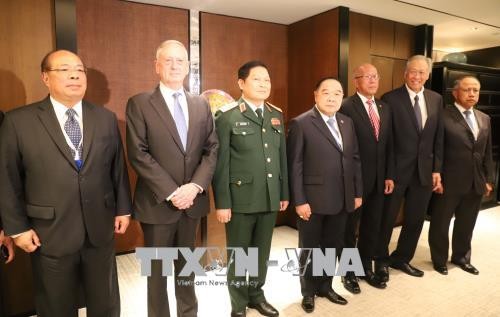(VOVWORLD) - The 17th Shangri-La Dialogue, the most important security forum in the Asia-Pacific region, concluded in Singapore last week. Countries agreed on the approach to resolve current security challenges, which raised their sense of responsibility and increased dialogue in response to power shifts in the region.
 Defense Minister, General Ngo Xuan Lich and Ministers of ASEAN countries at Shangri-La Dialogue (photo: Xuan Vinh/VNA in Singapore) Defense Minister, General Ngo Xuan Lich and Ministers of ASEAN countries at Shangri-La Dialogue (photo: Xuan Vinh/VNA in Singapore)
|
More than 500 delegates, who are Defense Ministers, Deputy Ministers, officials, and scholars from 50 countries and territories, attended the 17th Shangri-La Dialogue to discuss urgent regional security issues. The Dialogue was an opportunity for countries to identify and address new security challenges on the path to ensuring stability, peace, development, and prosperity in the Asia-Pacific region.
Common voice
At the Dialogue, India and ASEAN agreed on “the importance of achieving a free, open, transparent, rules-based, peaceful, prosperous and inclusive Indo-Pacific region”. Indian Prime Minister Narendra Modi spoke of a vision of an Indo-Pacific region, which is open, multipolar, and places no limitations on a particular member. He underscored the central role of ASEAN in shaping the regional architecture and Act East policy to fulfill the vision. He said ASEAN has been and will continue to be a major global centre in the future and India wants to cooperate for a peaceful and secure region.
ASEAN once again is at the centre of the Indo-Pacific region security strategy that India has engaged in with the US, Australia, and Japan. After recent complicated security issues, India wants to enhance its role as an influential and responsible partner in guaranteeing regional peace and security, and a powerful player in the Asia-Pacific region.
In fact, ASEAN-India cooperation not only creates economic benefits but also protects political and security interests to balance the regional security structure.
Upholding responsibility in maintaining regional peace and security
Regional developments and power changes in big countries have affected the Asia-Pacific power structure. Notably, China’s unilateral military activities in the East Sea have gone against current regulations and led to intense security challenges. The 17th Shangri-La Dialogue in Singapore created an opportunity for countries to discuss measures to maintain regional peace, stability, and prosperity.
Despite pending issues, countries are open to dialogue and cooperation in order to enhance mutual understanding and build trust. Experts said the Shangri-La Dialogue obtained practical results. The US said it is willing to work with China on a "results-oriented" relationship and pledged to strengthen security cooperation with ASEAN members. The Republic of Korea has promoted dialogue and diplomacy in settling the nuclear issue on the Korean Peninsula. Singapore is working with relevant countries to develop guidelines for unexpected military aerial encounters, which are expected to be approved at the ASEAN Defense Ministers’ Meeting in October.
Countries have agreed on their approach to avoid confrontation, and deescalate tensions, and collaborate for security and order in the region. The Dialogue has conveyed a message of respect for international law and order and guaranteeing equality among countries without differentiating between big or small countries.